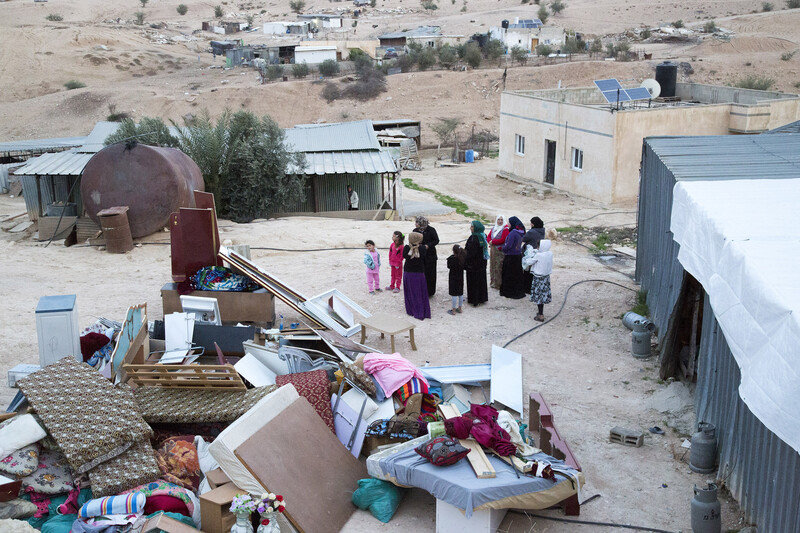Rights and Accountability 23 November 2016

Residents of Umm al-Hiran stand outside a home emptied of all its contents on 22 November.
ActiveStillsResidents of Umm al-Hiran, a Palestinian Bedouin village in present-day Israel, could have their homes demolished at any moment.
On Monday, the Israel Land Authority announced that the state would begin demolishing the village – located in the southern Naqab (Negev) region – the next day.
The 24-hour notice was abrupt. But it did not come as a surprise.
The people of Umm al-Hiran have been braced for the destruction of their homes throughout this year.
In January, Israel’s high court rejected their last-ditch effort to appeal against the planned demolition of their village.
The Israeli authorities want to build a Jewish settlement – named Hiran – in its place.
In preparation for the bulldozers, residents of Umm al-Hiran began dragging their furniture out of their homes on Monday night. Families stripped down their beds, cleared out their refrigerators and pantries, stuffed their belongings into plastic bags and folded their clothes into suitcases, as the below video shows:
Many political activists arrived in Umm al-Hiran on Monday night to spend the night with the villagers to bear witness to the demolition.The Israeli authorities decided against dispatching their bulldozers. By late morning on Tuesday, the crowd was informed that the demolition had been postponed.
In a Facebook message, Adalah, a group campaigning for Palestinians in Israel, credited the large presence of support in the village and around the world for delaying the demolition.
Temporary relief
The crowd briefly celebrated when they learned that the village had been spared. But the relief was temporary.
Israel’s intentions appear clear. During the summer, Israeli bulldozers began ploughing a trench around the village, marking those homes slated for demolition.
The Israel Land Authority – a state agency – has hired a private contractor to conduct the demolition at the cost of 119,000 shekels ($30,000). The agency has presented villagers with an invoice for that sum – in effect, making them pay for the destruction of their own homes.
The current demolition order is valid until the end of November, so bulldozers could arrive any day this month.
Umm al-Hiran is home to 1,000 people, who are Palestinian citizens of Israel. Like around 40 other Bedouin villages in the Naqab, Umm al-Hiran is not recognized and therefore its residents are denied basic services, like electricity and water.
“People are devastated and angry that the State of Israel is evacuating them to build a Jewish town there instead,” Keren Manor, a photographer with the group ActiveStills, said. Manor has spent much of this week in Umm al-Hiran.
The village lost a 13-year legal battle in May 2015, when the Israeli high court authorized government plans to displace its residents.
The people of Umm-al-Hiran have reportedly been offered some financial compensation and an 800 square meter plot of land in the nearby Bedouin town of Hura.
A number of Israeli Jews planning to live in the Hiran settlement moved into trailers and temporary houses that were established in 2011 beside the forest of Yatir, which neighbors Umm al-Hiran. They are waiting to expand onto the ruins of Umm al-Hiran.
False claims
The Israeli government and the Jewish National Fund provide – a government-backed group that works to colonize land inhabited by Palestinians – provides these settlers the basic services that are denied to Bedouin villages.
Though Umm al-Hiran has been inhabited since 1956, when the Israeli military forcibly transferred Bedouins there after removing them from their original village, Khirbet Zubaleh, the Israeli high court has ruled they have no legal rights to it.
According to Adalah, the court found that Israel had merely allowed the Bedouin citizens to use the land until now and the state is within its rights to revoke such permission. Adalah believes this rationale could be used to displace other Bedouin villages in the future.
Adalah urged the Israeli government this week to halt the demolition of Umm al-Hiran.
In a letter sent to the Israeli attorney-general, Adalah challenged a claim made by the state’s authorities that a solution had been found for housing Umm al-Hiran’s residents. Adalah insisted that there is no immediate housing solution and that the claim was false.
Meanwhile, in the Galilee region in the north of present-day Israel, authorities demolished the home of a Palestinian citizen of Israel on Monday for allegedly not complying with construction regulations.
On Wednesday, Israeli forces demolished three more homes in the central town of al-Lydd, displacing 16 residents.
Abdullah Abu Maarouf, a member of Israel’s parliament, the Knesset, from the Joint List, an alliance of parties mainly comprised of Palestinians in Israel, said this week, “Our main national aim is to prevent the demolition of any Arab home in the country, especially Arabs who built their houses on lands they inherited from their ancestors.”
Maarouf added that the reason Palestinian citizens of Israel build without authorization is because the Israeli authorities often reject their requests for permits.
Adalah reported that in 2015, only 4.6 percent of new homes built in Israel were in Palestinian towns and villages, though Palestinians make up more than 20 percent of the population.





